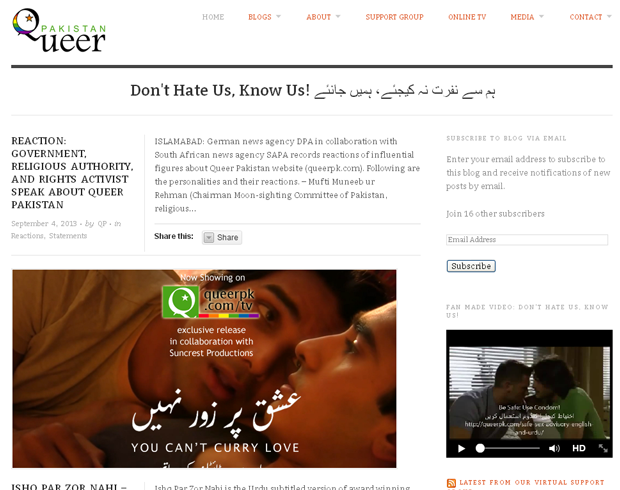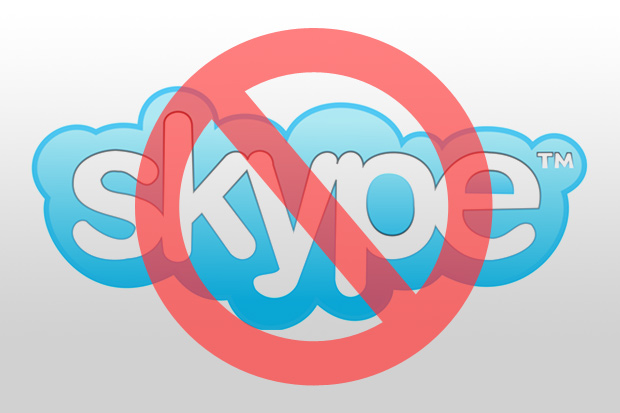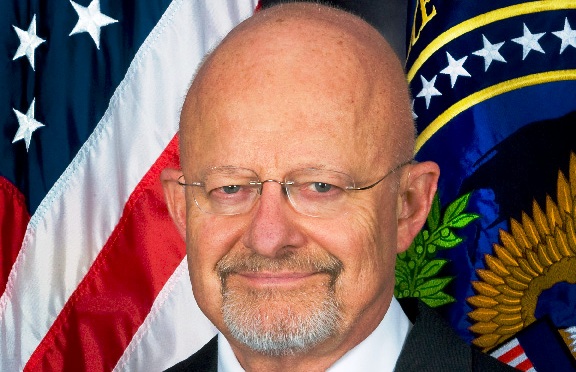Index relies entirely on the support of donors and readers to do its work.
Help us keep amplifying censored voices today.

Pakistan’s move to ban access to a gay website reflects the conservative society’s inability to accept a “larger world view”, activists say.
“Freedom of speech remains in peril and online privacy and security is almost nonexistent in the country making dissidents worry for their and their families’ safety”, Nighat Dad, a lawyer working with the Digital Rights Foundation in Pakistan, said.
Dad was referring to last month’s blocking of a gay website www.queerpk.com by the Pakistan Telecommunication Authority for being “against Islam”.
But for others belonging to the LGBTQ community, the ban has not come as a big surprise.
“They banned YouTube, you think Queerpk would count at all?” said banker Imran, requesting only his first name to be used.
“It was quite expected and shows how immature this society is and how our government is keen on pandering to the idiocies of the worst among us”, said Ali (also preferring to use just his first name).
Kashif Khan, a gay university teacher, considers the website ban “just the tip of the iceberg” of a certain “mindset” that holds sway within the Pakistani society.
“We, as minorities, are not the only one affected by this heightened sense of self righteousness and religiosity which stems from this complete inability to entertain and appreciate any world view other than our own,” he said.
Further, he points out: “The closing of the mind and quashing of this spirit of inquiry is probably because a lot of beliefs that we have held sacred might not stand the test of rationality and empirical evidence.”
But Ali, for one, does not think it was a great idea for a group of LGBTQ community to try and create a space a space for themselves in public domain.
“Gay people here do not want a gay rights movement because this society isn’t the kind of society in which a gay rights movement can take place,” he said.
For too long, the LGBTQ community has remained invisible. They continue to enjoy both peace and relative freedom, but many fear that the moment they try to rock the boat and start demanding their rights, they may invite the attention of the religious extremist elements within society -much to their detriment.
Even the Pakistani law refuses to take a tolerant view of their existence. Article 377 of the Pakistan Penal Code prescribes up to 10 years in jail and a fine for those caught engaged in homosexual activity. Consenting sex between a man and a woman outside of marriage is criminalised and punishment awarded.
On the other hand, safeguarding citizens’ privacy is enshrined in Pakistan’s constitution, which calls “privacy rights” inviolable.
It is for that very reason Shahzad Ahmad, country director of Bytes For All, Pakistan, says that the Pakistani society “first acknowledge and recognise that the LGBTQ community exists”. It is also important, he said, to give more space to such portals where the gay community can discuss their issues in a “mature, understandable and engaging way”.
Even for Queerpk team the ban was not unexpected “given the backlash the website had received online and ‘reporting’ to PTA”. The team was prepared with a Plan B. “We mirrored the website onto a new domain, routing all traffic to the new website,” the website’s spokesperson (who didn’t want his name to be made public) wrote in an email exchange.
In addition, the website ban has not affected the netizens visiting the website in any way: “It hasn’t! If anything, it has brought together several thousand more users, hundreds of whom have written to us in appreciation and support, many of whom were not connected to any support online or offline. So for all reasons, the blockade has worked in our favour,” the spokesperson added.
When it comes to freedom of expression, Pakistan is not the most generous of countries. Freedom House’s annual report Freedom on the Net 2013 put Pakistan among the top ten countries where internet and digital media freedom is curbed.
“The recent ban of Pakistani gay websites is a clear sign that the new government is following what the past governments have been doing in Pakistan,” Dad said.
According to Ahmad the government’s “moral policing policy” curbs alternate and progressive discourse was the reason behind the blockade of Queerpk. This is not the first time that gay websites have been targeted, he explains: “I remember, another LGBTQ social networking website ManJam was banned in Pakistan and that ban still exists for Pakistani users.”
Currently there are over a dozen dating and social networking websites aimed at the Pakistani LGBTQ community. But the case of QueerpK is different, say experts, because it was more than a networking website. “Many important and relevant issues were being discussed on the website and an alternate discourse on sexual minorities’ rights was, for the first time, discussed in a very mature manner in a conservative society like Pakistan,” said Ahmad.
“With the government’s internet censorship policies over last few years it is quite evident that this new medium for communication for LGBTQ community won’t last long,” he added.
For that reason, BFA feels compelled to work with different international organisations in support of Queerpk to voice its concern against the ban. “We have also raised this issue at different forums and are also planning to raise it at the Internet Governance Forum,” Shahzad told Index.
This article was originally posted on 15 Oct 2013 at indexoncensorship.org

The government of Sindh province warned last week it would block Skype, Whatsapp and Viber Tango.
Dr Asha Bedar, a clinical psychologist, looks at the news of a proposed three-month blockade of Skype and WhatsApp in Karachi, with much trepidation. Having recently moved to this southern port city of an estimated 20 million, these apps are almost like a lifeline.
“Like so many others, my family and friends are scattered around the globe. It’s these Skype, Whatsapp etc., that help bridge the distance. We are constantly in touch and able to share our joys and sorrows, ” she said.
The ban on internet chat and telephony apps including Skype, WhatsApp and Viber Tango is to help curb militancy, Sindh province information minister, Sharjeel Memon, said at a news conference last week.
Pakistan’s commercial hub, Karachi, has witnessed much violence in recent years. According to the Citizens-Police Liaison Committee, the city witnessed 2,124 murders last year and 2,058 in the last nine months.
Memon said terrorists had switched from cell phones to these networks which were difficult to trace.
However, the news opened a floodgate of criticism and derision from all strata of society.
“What next? Motorbikes, cars, cell phones, since the terrorists use all of these as well!” wrote Saroop Ijaz, a Lahore based lawyer in the Express Tribune.
Matters only got worse after 25-year old Bilawal Bhutto Zardari, co-chairperson of Sindh province’s ruling Pakistan People’s Party, tweeted: “Dear Burgers [referring derisively to westernized young people] Sorry abt Skype/Viber/Whtsapp. Excuse us while we catch some terrorists and save some lives. SMS for 3 months. Sincerely BBZ”.
“Our right to communicate shouldn’t be a victim to national security,” pointed out Sana Saleem of co-founder Bolo Bhi, a group that campaigns for freedom of speech.
Pakistan is among the bottom ten countries in the annual report — Freedom on the Net 2013 — by the Freedom House, an independent watchdog based in Washington D.C. The report measures internet and digital media freedom in 60 countries. It said Pakistan blocks objectionable content, monitors internet users, lacks adequate connectivity in rural areas and has not done enough to protect users from accusations of blasphemy.
The ban if imposed, even if temporary, can only reflect Pakistan as one of the most restrictive nations in the world for internet use.
The Pakistan Telecommunications Authority has a history of clampdowns. It has banned more than 4,000 websites for what it considers objectionable material, including YouTube, which was blocked last year after a U.S. citizen posted a film was deemed blasphemous by Muslims around the world. In 2011, in a particularly ill-thought-out move it announced censoring text messages containing swear words. In 2010, after a decision by the Lahore High Court, Facebook was blocked as a reaction to the ‘Everybody Draw Muhammad’ page that was seen as offensive to the prophet and in 2009, then interior minister had announced a ban on jokes ridiculing the President Asif Ali Zardari and warned that the Federal Investigation Agency would trace electronically transmitted jokes under the Cyber Crimes Act.
While Saleem says the impending ban reflected a “flawed counterterrorism policy”, sports reporter Faizan Lakahani, working for private television channel, Geo, feels it only showcases that the government “is just not competent in nailing down terrorists”.
Bans to restrict citizen’s freedom were not only futile but counter-productive. The government should use technology to trace out terrorists, instead, Lakahani said.
“The ban on cellular phones in the past has led to disabling of car security and home security systems,” added Saleem. “For every blockage there are dozens of ways to circumvent them. It would be a huge challenge and technology-wise nearly impossible to do a province specific ban.”
But for many like Bedar, the ban could significantly affect work.
“I work from home regularly and keep in touch with my clients. At times due to distance I even do therapy sessions on Skype. In addition, I regularly take up international assignments for which we often hold meetings and discussions via Skype. The ban could potentially affect both my work and efficiency,” she said.
Saleem , who uses Skype regularly for work, would also be affected. “I also use Whatsapp for work. Currently I’m working on short documentary stories on migrant workers and refugees in two different regions. I’ve Whatsapp’ed groups for people I’ve interviewed to keep in touch and to keep them posted once I’m back in Pakistan,” she said.
Many believe it wouldn’t be totally unfounded if the excuse to implement the ban was shaped by the telecommunications companies themselves, as these apps were threatening their revenues. Saleem agrees: “The telecom sector has been widely impacted because of these ad hoc measures”.
The ban has not been put into force because final authority rests with the central government in Islamabad. Interior Minister Chaudhry Nisar Ali Khan had already sounded out his reservations.
“The state has often backtracked from such announcements in the past after public outrage”, Saleem said.
This article was originally published on 7 Oct 2013 at indexoncensorship.org

NSA head James R Clapper
Dear Mr Clapper,
We are reaching out to you with important information that may be of crucial value in preserving your organisation’s integrity and purpose. As citizens of Pakistan, we feel there’s an unexplainable bond, a debt if you’d like to call it, that we owe to your agency; after all, we are the second most interesting people in the world in your ever-vigilant eyes. We are therefore writing to raise with you an issue of extreme importance & national security.
The information here is highly critical and can jeopardise our security if leaked; you see, the world does not really recognise whistleblowers as yet. We trust you to keep this to yourself.
The government of the United Kingdom and the government of Canada are both involved in activities that may be considered by you a grave violation of the sovereignty of your organisation. Independent research group The Citizen Lab – truly independent as they do not take government or corporation support – has revealed the presence of Netsweeper and FinFisher equipment in Pakistan, belonging to companies with headquarters in Canada and the United Kingdom respectively.
It is baffling that these two respected governments, your notable allies, have not taken the necessary steps to disable these equipments, or at the very least stopped the trade. FinFisher for one has been used actively in Bahrain, aiding the Bahraini government in cracking down on activists, including an activist your government has lauded and awarded. This seems to us as a painful revelation that shows a lack of faith in your agency from your own allies.
As far as we are concerned, we don’t understand why these companies need to sell this equipment to our government, and why our government needs to spy on us when your organisation has dedicated staff, labour, and, not to forget, extensive budgets to be able to do just that.
With a heavy heart, we hope to keep you informed (just in case you missed out) and hope that you will take strict action to strike down these Weapons of Mass Surveillance that are in blatant disregard, grossly disrespectful, and a gross violation of your integrity and the national security values of your country.
Yours sincerely,
Citizens of the Second Most Interesting Nation in the World
SIGN INDEX’S PETITION AGAINST INTERNET SURVEILLANCE
This article was originally posted on 27 Sept 2013 at indexoncensorship.org
A Pakistani human rights organisation has called for an investigation into an alleged “secret censorship deal” between the country’s government and Facebook. Sara Yasin reports
According to Bytes for All (B4A), a representative of the Pakistan Telecommunication Authority claimed on 4 July that “the government of Pakistan has an existing ‘arrangement’ with Facebook, which allows them to have ‘undesirable content and Facebook pages blocked as per directions from the authority”.
In an open letter to the Global Network Initiative (GNI) — of which Facebook is a member — B4A said that if true, it is “betrayal by the company towards the users of Facebook in Pakistan. The claim is upsetting because if true, it breaches the trust of its users, vehemently opposes what Facebook publicly proclaims in its principles, and is in stark contrast to the social network’s commitment to freedom of expression, peaceful assembly, and association as a member of the Global Network Initiative”.
On 22 May, at this year’s Stockholm Internet Forum, it was announced that Facebook would join the GNI — a multi-stakeholder group dedicated to promoting and defending freedom of expression in the Information and Communication Technology (ICT) sector.
“As the largest social network, both in Pakistan and the global cyberspace, we feel that Facebook following its own principles and the principles of GNI can go a long way in ensuring that citizen’s right to access, privacy, and freedom of expression are preserved even under hostile and difficult environments”, said B4A.
B4A has also been embroiled in a battle to reverse a September 2012 decision to block YouTube. The country decided to block the video sharing site for refusing to take down a clip from controversial anti-Islam film “Innocence of Muslims.”
Sara Yasin is an Editorial Assistant at Index. She tweets from @missyasin